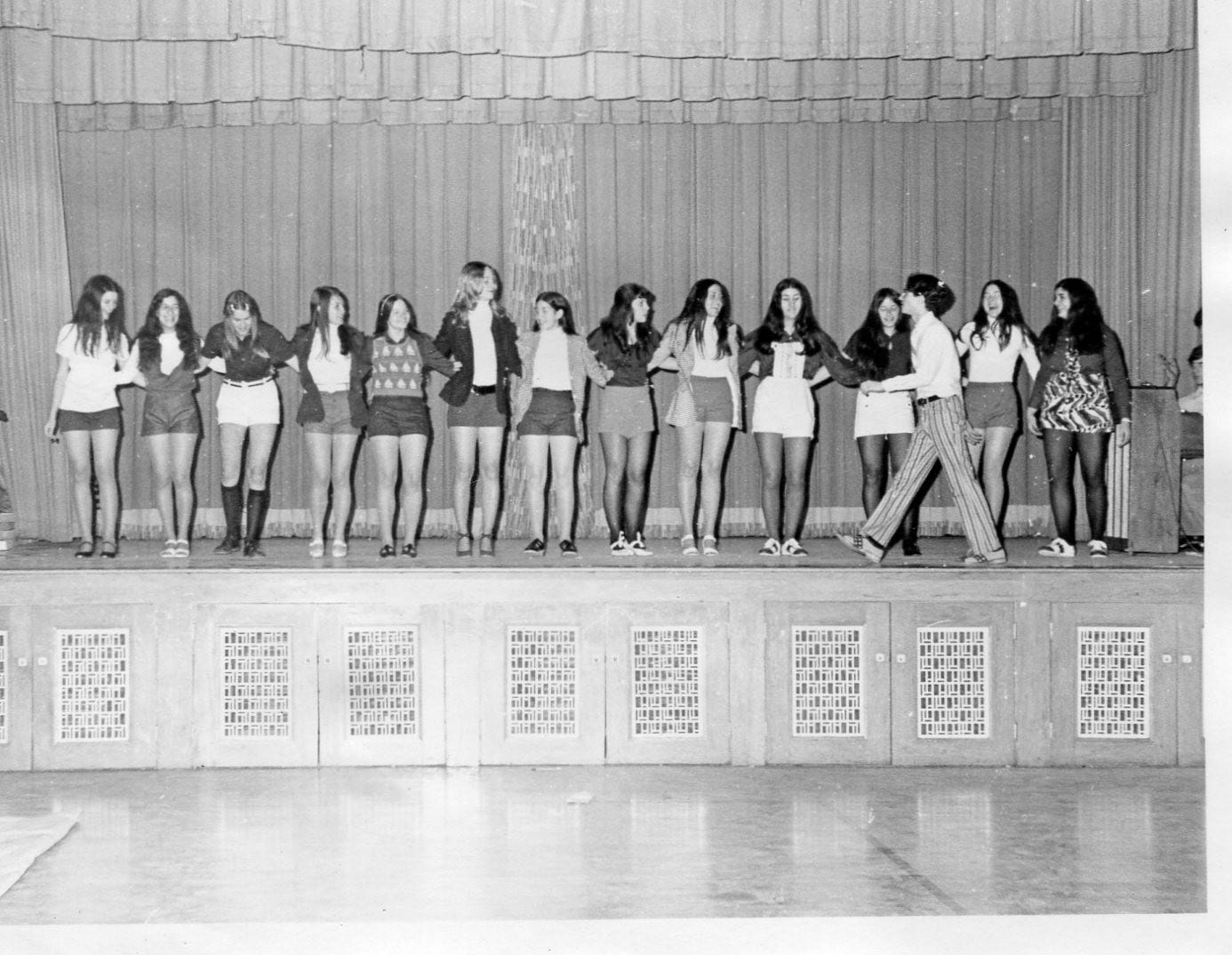How a high school student council offers some insight

“History repeats itself, first as a tragedy, second as a farce,” as Karl Marx is reputed to have said.
I’m reminded of the maxim as I mull over the prospects of a second Trump term, though I wonder if the order of the tragedy-farce progression would be reversed if the former president takes power again. The man’s first term was a bad joke and his second seems to promise many truly ugly things. Just see the recent Time cover story for evidence of how bad things might go: using the military to evict undocumented millions, detention camps, immunity for harsh police action (and for himself), stiff trade barriers, and, as noted elsewhere, removal of protections against political retribution for government employees, presidential control of the independent Fed, etc.
So why might Trump win? Well, the hush-money trial in New York is far from a lock, even as it looks damning for Trump, with an accountant testifying that Trump signed checks from a personal account to reimburse his lawyer for the payment to his paramour, Stormy Daniels. Certainly, that trial has had plenty of farcical elements – reminders of a porn star and a Playboy model, marital infidelity, illicit payments, disregard of the law and ordinary decency, etc. It would be a laughable parody, if it weren’t distressingly real.
But it’s not clear whether the evidence produced so far will persuade a jury (beyond a reasonable doubt) that Trump broke the law personally by knowingly falsifying business documents. Did he do that or order that? Or did his minions just do that while he was busy running for president in 2016? Can the prosecutors prove the former? That seemingly boring detail is the pivot on which the case turns.
And, even if the jury does pronounce him to be a felon, it’s doubtful that his legions of fans will decline notably. Even as his sordid history is rehashed — as Times columnist Bret Stephens put it — Trump’s favorability ratings in polls still linger at or above 40%. Despite knowing about much of his seedy and dishonest behavior during his first campaign, his fans backed him then; indeed, evangelical supporters saw him then (and likely see him still) as G-d’s flawed instrument, a sinner who nonetheless would do their bidding on things such as abortion and gay rights. Against all odds, a cousin of mine, for instance, is still posting amazing imagery about the divine embrace of Trump:

What is Trump’s secret sauce? Well, the usual suspects are white fear of national ethnic change (of which illegal immigration is actually a small part), rage at economic dislocation (global trade eroding jobs), and social change. Trump is brilliant at exploiting all that, for sure. Unlike the tumultuous and complex present, he invokes a gauzy past in seeking to “Make America Great Again.”
But some part of this is something more subtle and, perhaps, more pernicious – and for that, I must hark back to a small-bore event of over a half-century ago. Bear with me, gentle reader, as I draw your attention to my central New Jersey high school student council election, of all things.

In my junior year at the all-male prep school, a most unusual candidate ran for president of that council. Unlike his academically distinguished and sober-minded opponent – a boy who later went on to graduate from Wharton and become a health insurance company vice president – this candidate, Len E. Carmella, was described by a longtime friend as “a showman and an entertainer.” As the friend wrote in our school paper, Lenny sought his identity in applause, “in the warmth afforded all beloved clowns.”
Noting that Lenny’s campaign was marked by “a lack of depth,” this friend pointed to his ability, instead, to “make sweeping gestures and rhapsodize.” And he quoted him on his trenchant platform: “I’m going to be known as the entertainer-king. Every month, there’ll be a Dance, a Movie Night and a folk night. And we’re going to put on three shows, with costumes and everything. Movies, bus trips, anything like that, I’ll give money to. Anything that’s gonna keep them happy, that’ll take their minds off their problems, that’ll keep them entertained, is fine with me.”
Mind you, this was in the spring of 1971, when Nixon was still in office and the Vietnam War was still much on the minds of all of us of nearly draft age. Anything distracting would be welcome and Lenny, if nothing else, was remarkably distracting.

Lenny won. And his time in office was notable for just one major thing, a dance night featuring Bruce Springsteen and his band. Also, at one point, Lenny somehow was photographed strutting in front of a line of dancing girls, certainly an improbable image at our school (one where girls in the halls caused many to gape, stumble and stagger). Few of us are sure to this day of how either thing came to be.
So what’s the connection to events now, 53 years on? Well, if nothing else, Trump is an entertainer, even if a far meaner spirited one than Lenny ever was (though Lenny did enthusiastically and — often with Trumpesque vulgarity — back Trump back in 2016). After all, Trump made his name in “The Apprentice,” where he looked every bit like a capitalistic dark clown. And he continues to entertain even today, grabbing center stage in the news as he faces an astonishing legal onslaught. Even as President Biden claims all sorts of real gains – for helping keep the economy afloat, rebuilding our infrastructure, etc. – Trump dominates the headlines.
Because of his personal style – his autocratic strongman image – Trump is the dominant figure in our politics today, lording himself over other Republicans and Democrats alike. Next to him, Biden looks pallid and old.
“Politicians’ language reflects their dominance orientations,” a writer in The New York Times contended in an unsettling opinion piece. “Mr. Trump uses entertaining and provocative parlance and calls opponents — and even allies — weak, gutless and pathetic. Still, neuroscientists monitoring listeners’ brain activity while they watched televised debates found that audiences — not just Mr. Trump’s followers — delighted in the belittling nicknames he uses for his opponents. His boldness and provocations held audience attention at a much higher level than his opponents’ play-it-safe recitations of their policy stances and résumés.”
It’s as if Trump took a page from my high school student president’s handbook (which at times included taking shots at some fellow students). Substance – the sort of bland, by-the-numbers approach that marks Biden and other establishment pols – is nothing to many in the electorate. It’s all a matter of style, a question of keeping the masses entertained. Voters have a hard time with boring (see Gerald Ford and Jimmy Carter).
It’s also a matter of offering the middle-finger to those establishment types in both style and content. As the writer John Ganz put it in a conversation in March with Times podcaster Ezra Klein: “Yeah. I think that there is no separating form and content, as you said. That the figure has to represent the middle finger in order to be effective and get the constituency behind them…. But I don’t think it works without the theatrical, outrageous parts of it. And I think that that is part of the reason why people gravitate towards it. I think you speak — you could speak to people, and they may not have very clear ideas about any given policy issue, and yet, what they do believe is that the political establishment sucks, and they like somebody who tells them to fuck off.”
We have a long history of raucous table-pounding figures appealing to voters. Klein pointed to Pat Buchanan, an anti-immigrant firebrand who in many ways paved the way for Trump, and former KKK head David Duke, who was elected to the Louisiana State Legislature and made an unsuccessful run as a Republican for governor of the state. As Klein put it: “… there has long been demand for a right-wing populist showman in the United States. That demand has been at times unmet. It has been at times suppressed. These people were not given a candidate to vote for in a two-party system. But it never went away. Perhaps it will never go away.”
Oh, and there’s one more thing. At a time of seeming chaos in many quarters – see the many campus protests over the Gaza war – the strongman appeals to many. That’s no small part of the reason Nixon was reelected in 1972, when he ran as the law and order candidate against the dovish and gentlemanly George McGovern. In this, the campus protesters may inadvertently help Trump oust Biden from the White House, as writer David Brooks argues, and that is something that likely won’t go well for their cause.
Sadly, we lost Lenny a few years ago. He had many friends in our high school and later in college at Loyola in Montreal, where one person described him as a “genius at satirical graphics,” sharing his illustrations with staffers at The Loyola News. He was an entertainer and a mold-breaker in a small political way, but he had real talent and basic decency, something that the all-but-named GOP nominee lacked in 2016 and lacks even more now.
